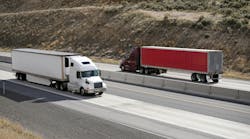Making a living as a food distributor isn't easy, as George Andrews III can attest to. He and his two siblings are the third generation running the family-owned business. “Our business is very expensive to operate and highly labor intensive,” he says. “Profits at year-end average just about 2% in this industry.”
George's grandfather started the business in Pueblo, CO, in 1926 as JG Andrews Fruit and Produce Co. In 1969 his father incorporated it as Andrews Produce, but in 1975 they began adding a variety of frozen foods and other grocery products to their line in order to remain competitive. Today they offer over 6,200 items to their customers, and to better reflect this shift away from just produce, the company now is doing business as Andrews Food Service.
Andrews says it's critical his business is run as cost-efficiently as possible. “We're constantly looking for ways to save money in day-to-day operations, such as by combining routes and trying to improve fuel economy in the vehicles.”
One of the ways Andrews Food Service cut down on expenses was to consolidate its warehouses last year — which were spread out in three different locations — into one facility in Pueblo West. There they have 100,000-sq.-ft. of warehouse space and 8600-sq.-ft. of offices.
Increasing safety is another way the company is cutting costs. Andrews says drivers are in and out of the truck all day long, making 30-40 deliveries a day. “On our trailers we've added extra hand rails and put in step ladders to make getting in and out easier on drivers. We've also built wider ramps, going from 18-in. to 24-30-in. ramps so drivers have more room to wheel-off product,” he points out.
The company owns its 25 trailers, the majority of which are Utility vans refrigerated with Thermo King units. Power units consist of three straight trucks and 22 single- and tandem-axle tractors, mostly Kenworth T800s with short 180-in. wheelbases, as well as a couple of T300s for city deliveries, and six Freightliner units.
The Kenworths are leased through PacLease at MHC Truck Leasing in Colorado Springs. The full-service leases are usually for six years, with trucks averaging about 100,000 to 120,000 miles a year.
At Andrews Food Service, drivers are involved in the spec'ing process, Andrews reports. To make their jobs easier and more attractive, the trucks are equipped with air-ride seats and suspensions. They also feature conveniences like CD players. Trailers also are air suspended. And to protect cargo, E-Traks are installed, which prevent pallets from shifting during transit.”
“We have 30 full-time drivers and they are each assigned to their own truck. They work 15-hour days, and routes can take them as much as 400 miles one way, which is a two-day run,” Andrews advises.
“We cover all of Colorado except for the western slope [Grand Junction area], as well as northern New Mexico and the panhandle of Oklahoma. For the most part, drivers are assigned to customers and routes, which increases customer service and makes it easier for the driver, who knows exactly where to go, how to back the truck in, which side of the restaurant to deliver on, etc.,” Andrews explains.
All maintenance is performed by PacLease. “We make deliveries 24/7, depending on the needs of the customer,” Andres notes. “We have to be ready to roll at any given hour. With PacLease there's always a backup truck when we need it. And they fit maintenance around our schedule, as well as offer us the assurance of emergency road service.”
Andrews Food Service does around $40 million in sales a year. Restaurants account for 54% of the company's business, schools 31% and prisons 15%.


